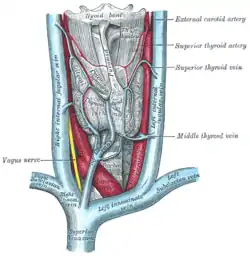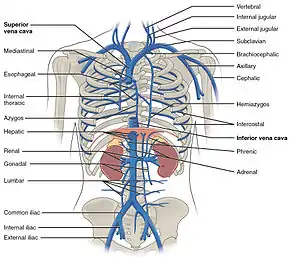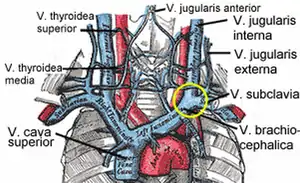Brachiocephalic vein
The left and right brachiocephalic veins (previously called innominate veins) are major veins in the upper chest, formed by the union of each corresponding internal jugular vein and subclavian vein.[1] This is at the level of the sternoclavicular joint.[2] The left brachiocephalic vein is nearly always longer than the right.[3]
| Brachiocephalic vein | |
|---|---|
 The thyroid gland and its relations. (Label for "Right innom. vein" and "Left innom. vein" visible at bottom center.) | |
 The arch of the aorta, and its branches. (Right innom. vein labeled at upper right; left innominate vein labeled at center top.) | |
| Details | |
| Source | Internal jugular subclavian superior intercostal vertebral inferior thyroid |
| Drains to | Superior vena cava |
| Artery | Brachiocephalic artery |
| Identifiers | |
| Latin | vena brachiocephalica vena anonyma |
| MeSH | D016121 |
| TA98 | A12.3.04.001 |
| TA2 | 4772 |
| FMA | 4723 |
| Anatomical terminology | |
These veins merge to form the superior vena cava, a great vessel, posterior to the junction of the first costal cartilage with the manubrium of the sternum.[4][5]
The brachiocephalic veins are the major veins returning blood to the superior vena cava.[3]
Tributaries

The brachiocephalic vein is formed by the confluence of the subclavian and internal jugular veins.[1] In addition it receives drainage from:
- Left and right internal thoracic vein (Also called internal mammary veins): drain into the inferior border of their corresponding vein
- Left and right inferior thyroid veins: drain into the superior aspect of their corresponding veins near the confluence
- Left and right vertebral vein
- Left superior intercostal vein: drains into the left brachiocephalic vein[6]
Embryological origin
The left brachiocephalic vein forms from the anastomosis formed between the left and right anterior cardinal veins when the caudal portion of the left anterior cardinal vein degenerates.
Additional images
 Diagram showing completion of development of the parietal veins.
Diagram showing completion of development of the parietal veins. Front view of heart and lungs.
Front view of heart and lungs. The fascia and middle thyroid veins.
The fascia and middle thyroid veins. Right Brachiocephalic vein
Right Brachiocephalic vein Right& Left Brachiocephalic vein
Right& Left Brachiocephalic vein Right& Left Brachiocephalic vein
Right& Left Brachiocephalic vein The brachiocephalic veins, superior vena cava, inferior vena cava, azygos vein and their tributaries.
The brachiocephalic veins, superior vena cava, inferior vena cava, azygos vein and their tributaries.
References
- Gupta, Arjun; Kim, D. Nathan; Kalva, Sanjeeva; Reznik, Scott; Johnson, David H. (2020-01-01), Niederhuber, John E.; Armitage, James O.; Kastan, Michael B.; Doroshow, James H. (eds.), "53 - Superior Vena Cava Syndrome", Abeloff's Clinical Oncology (Sixth Edition), Philadelphia: Elsevier, pp. 775–785.e2, doi:10.1016/b978-0-323-47674-4.00053-0, ISBN 978-0-323-47674-4, retrieved 2020-11-20
- Chitnis, Cumberbatch, Gankande. Practice Papers for MCEM Part A, Wiley-Blackwell 2010
- Fligner, Corinne L.; Clark, John I.; Clark, Judy M.; Larson, Lyle W.; Poole, Jeanne E. (2018-01-01), Poole, Jeanne E.; Larson, Lyle W. (eds.), "2 - Surgical Anatomy for the Implanting Physician", Surgical Implantation of Cardiac Rhythm Devices, Elsevier, pp. 13–58, doi:10.1016/b978-0-323-40126-5.00002-1, ISBN 978-0-323-40126-5, retrieved 2020-11-20
- Mozes, GEZA; Gloviczki, PETER (2007-01-01), Bergan, John J. (ed.), "CHAPTER 2 - Venous Embryology and Anatomy", The Vein Book, Burlington: Academic Press, pp. 15–25, doi:10.1016/b978-012369515-4/50005-3, ISBN 978-0-12-369515-4, retrieved 2020-11-20
- Long, Chandler A.; Kwolek, Christopher J.; Watkins, Michael T. (2013-01-01), Creager, Mark A.; Beckman, Joshua A.; Loscalzo, Joseph (eds.), "Chapter 61 - Vascular Trauma", Vascular Medicine: A Companion to Braunwald's Heart Disease (Second Edition), Philadelphia: W.B. Saunders, pp. 739–754, doi:10.1016/b978-1-4377-2930-6.00061-6, ISBN 978-1-4377-2930-6, retrieved 2020-11-20
- Ryan, McNicholas & Eustace "Anatomy for Diagnostic Imaging: 3rd Edition"